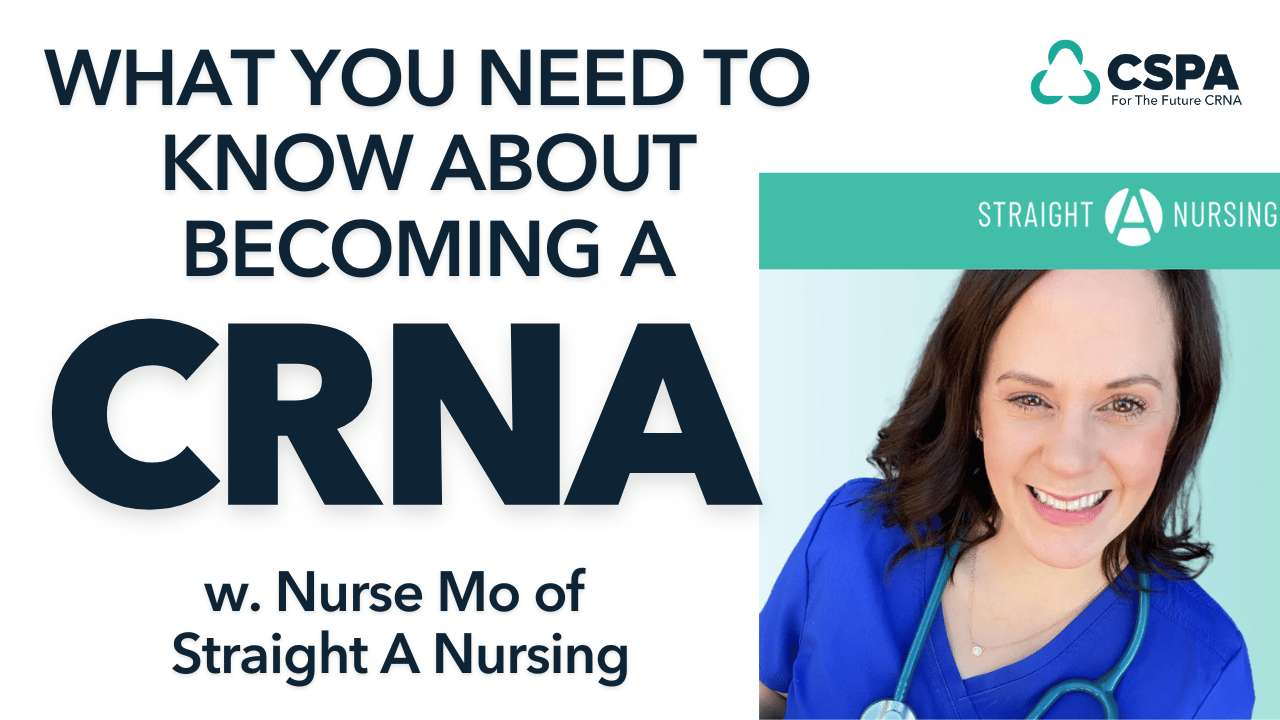
FREE! The Most Affordable CRNA Schools:
Free The Most Affordable CRNA Schools Guide Click Here
Weather the storms of CRNA school with a solid financial plan in place. Today, our host Jenny Finnell thoroughly discusses the topic of CRNA school debt. She breaks down the myths surrounding the financial burden of pursuing a career in nurse anesthesia and shares actual financial management tips for finishing CRNA school without drowning in debt. She candidly talks about the realities of CRNA school, student debt, and life after graduation. Throughout the episode, Jenny highlights the importance of planning ahead, making informed decisions, and taking necessary risks and sacrifices. Tune in now and learn about debt after CRNA School.
Thousands of nurses have gained CRNA school acceptance with CRNA School Prep Academy. Join today for access to all of the tools proven to accelerate your CRNA success! Click here:
https://crnaschoolprepacademy.com/join
Join the CSPA email list: https://www.cspaedu.com/podcast-email
Join the Free Facebook Community here! https://www.facebook.com/groups/crnaschoolprepacademyfree
Book a mock interview, resume or personal statement critique, transcript review and more: www.teachrn.com
—
Watch the episode here
Listen to the podcast here
How Much Debt Will You Be In After CRNA School?
We’re going to do a quick episode because I want to unravel this myth and help you get clarity on how much debt you will have after CRNA school. Let’s go ahead and get into this episode. We’re going to talk about how much debt you can expect after CRNA school. I think this is a common concern or worry for a lot of students preparing for this journey. I want you to do a quick episode, shed some light on this fact, and give you something to expect.
First, I want to preference this with it is going to depend a lot on every individual in this process. Maybe you’re good at saving or you’re a spender. I’m raising my hand to that because I’m definitely a spender. This is going to look different for everyone, depending on your spending preferences. I want to at least paint a picture with what is the average cost of CRNA school and all those other things that go into it. You’re looking at a ballpark figure of right around $100,000 to $120,00 is the average cost of CRNA school at present. There are eleven that are $60,000 or less. Keep in mind that prices change every year. You do still have to look up your schools.
Unfortunately, the prices are slowly but surely increasing like everything in this world. Maybe they’re $62,000 now by the time I made this episode and looked up those statistics. You are looking again at right around $100,000 to $120,000 as the average cost of CRNA school, with the most expensive schools being around $200,000. A lot of schools do not allow you to work, especially for the last two years of the program. Usually, for the first nine months or so, you can get away with maybe working a shift here and there while you’re doing your DNP project for the schools that are front-loaded.
Typically, most schools, by the time you start your clinicals do have you step back as far as how much you’re working. Honestly, you wouldn’t want to work while doing clinicals. You don’t want to risk getting bad grades or getting kicked out due to trying to juggle too much at once. It is best to suck it up in the meantime and take out loans to live, which I know is cringe-worthy. People have done it. People have survived. I’m living proof of that. Plenty of CRNAs I work with have also done the same thing.
This can get complicated because, essentially, if you are on your own, you don’t have any support as far as being married or mom and dad or anyone like that who’s willing to cosign for you, it can get to be very difficult to get private loans when you’re unemployed. You do have to have a plan, whether that’s someone to cosign for you like a significant other who is essentially going to be able to go in on loan with you. You will need a cosigner for private loans.
Budgeting Is Key
Student loans will get you most of the way. You will have to do graduate plus loans. For the most part, it should cover the majority of it, but it might not cover all of your living expenses. It’s like what we did- This was years ago. We cut out all unnecessary expenses. That was things like going out to eat. Definitely don’t buy Starbucks. We cut out cable. We did keep our Netflix subscription. We did have a gym membership subscription. For the most part, we cut out everything that we felt was not 100% necessary for our physical or mental health.
We drove used cars, cars that were paid off. I named mine Old Betty. She got me through CRNA school. She would have been a fourteen-year-old Nissan Sentra by the time I got rid of her. That was even two years after I graduated CRNA school until my door handle broke off in the snowstorm. I was pregnant, and I finally decided enough was enough. I deserve a new car. I can afford one. I still have that car.
Anyhow, so just be thrifty with your finances. Obviously, pick and choose what you want to spend your money on. The biggest piece of recommendation I can give you right now is to have a budget. Knowing what exactly you need month to month, week to week, and when certain things come out of your checking account, you know how to budget.

CRNA School Debt: Have a budget. Know what exactly you need month to month, week to week, and when certain things come out of your checking account.
What made it easier was that I had two separate savings accounts. That way, I would put my loan payment money, meaning our tuition payment money, in a certain checking account. I knew I had enough to pay tuition. There were no questions. I wouldn’t screw it up. My personal savings and my personal checking account were whatever I did with it. I had a separate savings account that I made sure I had enough money in every semester and quarter to cover my tuition.
There was an issue I had once in school where I dropped below “full-time status” because that’s when the clinicals picked up. I got a notice from my loans that were deferred that I was required to start paying on them. That was a freak-out moment because I couldn’t afford to do that. I was able to get a letter from my program director to essentially let the loan people know that, yes, I truly was indeed full-time, even though I wasn’t showing enough credits and that clinicals replaced those credit hours.
If that happens to you, try not to freak out, but go to your program, ask for help at that end of things. The budgeting thing is key. How much do you need for your rent, your car payments, and any other loans? I highly recommend that you pay off any credit card debt before you start CRNA school. That is key. You do not want that hanging over your head.
Loan Deferment
Another thing to consider is loan deferment. I had deferred undergrad loans because I couldn’t afford to pay all the other bills and my undergrad payments. That was a painful moment. When I was getting ready to graduate from the CRNA school that I went to, they started like, “You’re going to start paying again here soon. You’re going to graduate.” They sent me the information bill, anticipating that it would be reinstated in six months.
I owed over 110% of my student loans after I spent three years paying on them as a nurse. That made me want to cry. That was a sad day. By deferring my loans for a little over 2 years, I have just wiped out 3 years of payments and then some. It was very depressing to see that happen. Just be cognizant that that interest stacks up, and it stacks up very quickly on $90,000 or $70,000 a loan, which is what I had as an undergrad. The interest comes back quickly.
If you are able to at least make your minimum payments on your undergrad loans, I do suggest that if you’re able to swing that. You’re still going to accrue interest, but you’ll at least won’t be getting over 100% of your loans to come back at you. You’re at least going to be making what you need to keep the interest at bay so you don’t have that happen to you. I do recommend that if it’s possible. In the best case scenario, you’re still able to pay your minimum payments on your student loans that you have from undergrad if that’s the case.
Taking Out Stipends
Other things to consider as far as how much debt you’re going to have when you get out of CRNA school is where you live during CRNA school. You can share a place with someone else. I know some students have to travel to different clinical sites and get Airbnbs and extended stay facilities. That adds up quickly. Knowing those details when you pick your CRNA program is going to allow you to understand what this is going to look like for me. I know for me, I had to go spend 3 to 4 nights a week away from my home and I stayed with my parents because it happened to be by the school that I went to. I traveled two hours one way to get to class, but then nowadays, so many things are hybrid online. I don’t even think they make students do that anymore, but I had to travel two hours one way to get to class.
I had class 4 to 5 days a week in the beginning. I would stay with my parents and go to class every day and then go back home, which was two hours away on the days that I had a few days off. That’s how I managed that situation. A few of my other classmates had to get extended-stay hotels to make this work for them. That does add up. That is something to keep in mind there.
I graduated. I went to one of the most affordable CRNA schools. It’s on that list, by the way. I’m not going to share which one it is. I went to one of the most affordable CRNA schools. I had to take out not only money to cover my tuition but I had to get loans to cover some living expenses because we didn’t quite make ends meet with just my husband’s salary. I also got a stipend while I was in graduate school for a job that I took after school. That stipend was about $35,000. I was able to start collecting on that stipend prior to graduating. That helped get us through. If it wasn’t for that stipend, we would have taken out more loans.
Be careful with stipends because some hospitals that offer stipends offer them for a reason. It’s because they can’t retain staff. That’s a red flag to keep in mind. That’s not always the case, but it can be a red flag as far as why do they have to offer stipends to work here. Is it that bad? Are people leaving? Is it a mass exodus? Just talk to people who work there.

CRNA School Debt: Be careful with stipends because some hospitals that offer stipends offer them for a reason. It’s because they can’t retain staff.
Make sure it’s a desirable place to work. Make sure you want to work there because most stipends come with term terms, meaning you have to give us four years of your life, or else we’re coming for you and then some interest. You have to make sure, and they will. They have a legal team behind them. They will come for that money, and they will collect their interest. You do not want to mess with that.
Make sure you know when you’re signing up for those stipends that you’re equally signing away a chunk of your life, and you need to make sure you’re going to hold to those terms. I knew people who signed those contracts and took the money. For whatever reason, after a year or two of working, maybe they owed four years, they decided to move, or their spouse relocated, and then they wanted to relocate, but they couldn’t get out of that contract. They ended up owing a bunch of money. It was messy and ugly. You don’t want that to happen to you.
I know sometimes you don’t know what’s going to happen. If you have a spouse who’s always moving around or has potentially the ability to relocate for a job, consider that before you sign for a year or four-year contract. That’s just some advice. I went to one of those affordable schools that were under $60,000, plus took out a little bit of living loans, probably about maybe $1,000 or $2,000 a month, approximately for living that was on top of what my husband was making per month to make ends meet.
Essentially, I had to replace my salary as a nurse, which back then was around $3,000 a month, which is what I was bringing in as a nurse. We essentially had to take out just under that in personal loans in order to keep a roof over our heads. I think we did manage to cut $900 a month out of our budget, but that was the most we could do. We had to take out $2,400 a month or so, approximately extra to live on, on top of my husband’s salary.
We did that. I got the stipend like I mentioned. I ended up with $70,000 in total for my graduate loans back when I went to CRNA school. My school was cheap. I want to say it was $40,000 for the entire program. I want to say it’s closer to $60,000 now. This is many years ago. That being said, I took out that plus about $30,000 or so of personal loans. Plus, I had the stipend, which saved us from taking out even more personal loans. I had $70,000-ish, $75,000 of undergraduate loans. I had about $150,000 in student loans by the time I was done with school.
Payment Plan
For the first 1 to 2 years, I paid quite a bit extra every month on it. I didn’t have any kids, and I was working full-time, extra, joined a cardiac team, did a lot of 24-hour shifts, and made a lot of money doing that. I was able to pay down those loans pretty quickly. Soon, though, unfortunately, after I had kids, I got absent-minded about paying any extra. At that moment, I refinanced and made sure I had a lower interest rate.
I was looking at around $70,000 of graduates, $70,000 for undergrad, so about $150,000 total, give or take $5,000 or $6,000 here and there. I ended up paying all of that off in a total of seven years. In the first two, I was just paying extra all the time. I finally got lazy with that. I refinanced and set it up on a five-year repayment plan. I set it and forgot it. I just kept paying. If I remembered to pay extra, I would, but I didn’t always remember.
That’s my recommendation to you. When you’re done with school, refinance your loans, decrease your interest rate if possible, and then set it up on a payment plan. Make sure you get it paid off as soon as possible. We didn’t have to make any life sacrifices. We lived very well, being able to pay off $150,000 of debt in seven years.
When you're done with school, refinance your loans, decrease your interest rate if possible, and then set it up on a payment plan. Click To TweetMost people, I think, in this day and age are coming out with about $200,000 to $250,000. My rule of thumb to think about is that you want to make sure you have less than a 100% debt-to-income ratio, meaning if you have $150,000 of debt, what is your income? It should be at least $150,000 of income. When you start looking into having more of that ratio, such as where you’re making $100,000 and you have $150,000 of debt, it becomes much harder to pay that debt off in a reasonable amount of time. That’s a ballpark figure to help you gauge where you’re going to be.
The average CRNA salary now is right around $200,000. It is skyrocketing. The last few years have been insane. I’ve seen a huge leap in hourly rates for CRNAs. Obviously, it still depends on whether you’re a new grad or whether you’re living in Ohio versus New York. It depends on where you live. Even in places that are very affordable living, we have seen a dramatic increase in hourly rates, especially if you’re looking at locums, which is equivalent to travel nursing, but it’s the travel CRNA world called locums. You can make $200 an hour or more. Some people make their whole careers out of doing that, and they just move around. It just all depends on what you’re looking for.
I hope this helps shed some light. I am rooting for you. I would say don’t let the fear or stress of debt deter you from becoming a CRNA. It is doable to pay off, but be very careful and plan for your financial security. Plan for the what-ifs or the unknowns. Life doesn’t stop because CRNA school happens. You’re going to have your car break down. Your kids are going to get sick. Your dog’s going to get sick. Your family member might get sick. Things happen.
Have an A, B, and C backup plan financially to be able to support you during school. Have a plan. If something terribly goes wrong, you can move in with Mom and Dad, whatever it may be. Have those plans in place to make sure you are going to be okay even if the worst-case scenario unfolds. Hopefully, it does not, but you have to plan for the worst case, and that way, you can make sure you can weather the storms. CRNA school is short, but it can feel long. The years are short, but the days are long. I hope you guys found this episode helpful. You guys take care. Until next time.
Important Links
FREE! The Most Affordable CRNA Schools: https://www.cspaedu.com/mdq5xg0p
Thousands of nurses have gained CRNA school acceptance with CRNA School Prep Academy. Join today for access to all of the tools proven to accelerate your CRNA success! Click here:
https://crnaschoolprepacademy.com/join
Join the Free Facebook Community here! https://www.facebook.com/groups/crnaschoolprepacademyfree
Get CRNA School insights sent straight to your inbox! Join the CSPA email list: https://www.cspaedu.com/podcast-email
Book a mock interview, resume or personal statement critique, transcript review and more: www.teachrn.com








